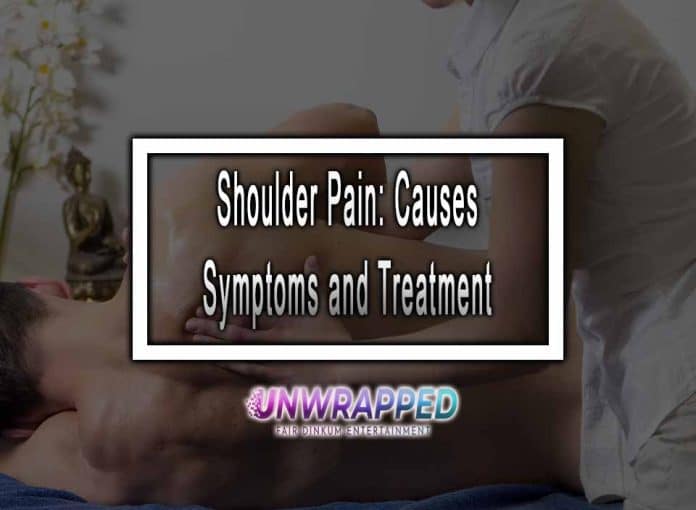Causes of Shoulder Pain, Symptoms and Treatment
Shoulder discomfort is a typical cause for going to the doctor. The shoulders are our most flexible joints, but they are also the most utilised since they link three bones: the shoulder blade, the humerus, and the collarbone. Doing your hair, drinking coffee, or driving a vehicle are just a few of the regular activities performed by the shoulder. And doing these actions over and again might weaken the shoulder. It’s also a complicated joint since the shoulder is made up of many joints, muscles, and tendons. As a result, shoulder discomfort may have a variety of reasons, all of which influence therapy options. That’s why, if you’re experiencing recurrent shoulder discomfort, you should consult a doctor.
A variety of factors may cause shoulder discomfort due to the intricacy of the shoulder joint: Joints, tendons, muscles, nerves, and bones are all involved. Tendonitis in the shoulder, which is inflammation of the tendons responsible for motion (“rotator cuff”), is the most common cause of shoulder discomfort. Tendonitis may be caused by age-related natural wear or one or more actions that are misperformed frequently (for example, as part of a job) a physical exercise or a sport involving repeated motions).
A painful shoulder may also be caused by medical illnesses (such as bursitis or calcifications), traumatic reasons (tears, ruptured tendons, sprains, dislocations, scapula, humerus, or collarbone fractures), or inflammatory diseases (such as arthritis) (such as osteoarthritis or arthritis).
However, the discomfort may occasionally be caused by anything unrelated to the skeletal muscles. For instance, pain may also be caused by an infectious condition, a neurological disease, or a heart or lung ailment. As a result, if you have shoulder discomfort, or even if you simply feel something out of the ordinary, for example, your shoulder popping without pain or restrictions on your ease of movement, you should see a doctor as soon as possible: the doctor will be able to diagnose the problem and begin therapy promptly.
Symptoms
Shoulder pain can manifest itself in different ways:
- a pain in the shoulder of variable intensity, present or not at rest, which increases with intense activity
- a pain that radiates to the arm and sometimes to the hand
- stiffness of the shoulder
- swelling, edema, or swelling
- decrease in function of the shoulder, arm and/or hand
- a sensation of crunching in the shoulder
Because shoulder pain affects our daily activities, it can quickly become a disability: that is why it needs to be treated as soon as possible.
Diagnosis
A hurting shoulder should be addressed according to the source of the discomfort. The diagnosis of shoulder discomfort, on the other hand, is very difficult owing to the enormous number of probable causes. The doctor must first evaluate if the pain originates in the shoulder or whether it originates elsewhere and radiates into the shoulder.
Must See: Health Tips: How Can CBD Products Help You Feel Better?
Muscle testing may usually be done to establish which muscle or tendon is causing the discomfort. However, information regarding the patient’s professional activity, recreational activities, or past accidents might aid the doctor in the diagnosis and localisation of the pain and the symptoms linked with it. If the discomfort isn’t caused by skeletal muscle, then thorough testing is required. Ultrasound scans can frequently tell whether the symptoms are caused by a problem with the heart, lungs, digestive system, or nerves, for example.
Treatment of shoulder pain
Shoulder discomfort may be managed after a doctor has established a diagnosis. In most circumstances, pain medications (e.g. acetaminophen) and/or anti-inflammatory medicines may be used in conjunction with physical therapy to address shoulder discomfort that originates in the shoulder. Or you may want to try non-prescription products such as Delta 8 Seltzers. Many people use Delta 8 products to help with pain relief from short-term or chronic pain conditions and injuries. Cortisone injections may also be used to treat severe pain. Surgical intervention is a possibility, however, it is seldom used. This surgery is especially advised in a rotator cuff injury caused by trauma.
Furthermore, various therapy options that do not need prescription medicines may help reduce and relieve shoulder discomfort. This is especially true with OMRON’s pain-relieving devices: These devices provide excellent muscle and joint pain management by combining pain-relieving heat with transcutaneous electrical nerve stimulation (TENS).
However, certain measures may be taken to give pain relief in ordinary life. Any movement that produces discomfort should, of course, be avoided. Never try to make a movement that hurts. When your shoulders are weighted, keep your elbows tight to your torso. Make sure your elbows are at a 45° angle to your torso while working at a desk.
Must See: Taking Care of Your Health As You Age: 10 Things to Remember











